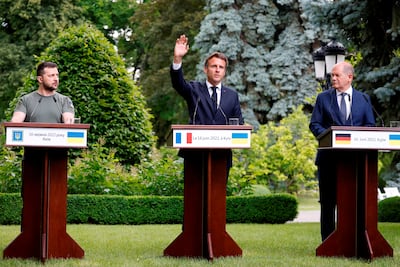Hungary has come out against any further European Union sanctions on Russia, blaming the punitive measures for exacerbating the cost-of-living crisis in Europe.
Prime Minister Viktor Orban said he opposed calls from Ukraine and some EU members for a seventh sanctions package to raise pressure on the Kremlin to call off its four-month invasion.
Mr Orban, whose brinkmanship over the sixth round of sanctions won him few friends in Brussels, said the measures against Moscow were "the main cause of economic problems" besides the war itself.
"We say yes to peace, but no to more sanctions," Mr Orban was quoted as saying by his spokesman, Zoltan Kovacs. "We need peace now, not more sanctions, as the only antidote to war inflation is peace."
Supporters of further sanctions say additional measures are needed to starve the Russian war effort of money. For example, by cutting off payments for gas.
"Russia must feel a constant increase in pressure for the war," Ukrainian President Volodymyr Zelenskyy said this week as he called for a seventh round of sanctions.
But fatigue has set in among some countries after the fractious talks on the oil embargo, which Hungary held up for almost a month until it won an exemption for its pipeline imports from Russia.
There was further frustration at Hungary's tactics after it caused a last-minute delay by insisting that a Russian religious leader be removed from the sanctions list.
Other countries, including Belgium, have called for a pause before charging back into the sanctions process, while Austria opposes a gas embargo. But Hungary is the first to call for a total stop.
The six rounds of EU sanctions so far have restricted trade with Russia, isolated its financial system and penalised senior figures in President Vladimir Putin's inner circle.

No new sanctions were expected to emerge from a two-day EU summit in Brussels this week, although leaders were set to extend some existing measures for another six months.
There was some sign of rapprochement between Ukraine and Hungary on the first day of the summit after Mr Orban backed the Ukrainian application for EU membership, which has cleared its first hurdle.
Mr Zelenskyy, who publicly berated Mr Orban for his Russian sympathies when he addressed EU leaders in March, on Thursday said he was grateful for Hungary's support.
“Thank you, Viktor … together we are capable of much more than alone,” he said.
But Mr Orban's stance on sanctions demonstrated the EU's less united position on the economic fallout of the war, the main theme of the second day of talks.
Senior EU figures blame the war in Ukraine for driving up the price of food and energy, with inflation in the eurozone at 8.1 per cent last month compared with 2.3 per cent a year ago.
There are divisions over how far EU governments should intervene in the market to ease the pressure on households, for example by capping prices.
"We have to realise that inflation will stay with us for a longer period," Slovakian Prime Minister Eduard Heger said. "Covid cost us a lot of money and we have to think twice what we do now."
Leaders were also discussing French President Emmanuel Macron's proposal for what he calls a European political community, a looser alliance than the EU that could bring in applicants such as Ukraine and potentially Eurosceptic countries such as Britain.
An EU official said regular meetings were envisaged between the leaders of participating countries to foster unity and strategic cohesion in Europe, and that the idea would be taken forward in the coming months.
But applicants to the EU such as Ukraine and North Macedonia have said Mr Macron's community should not be used to fob them off, rather than granting them full membership.


